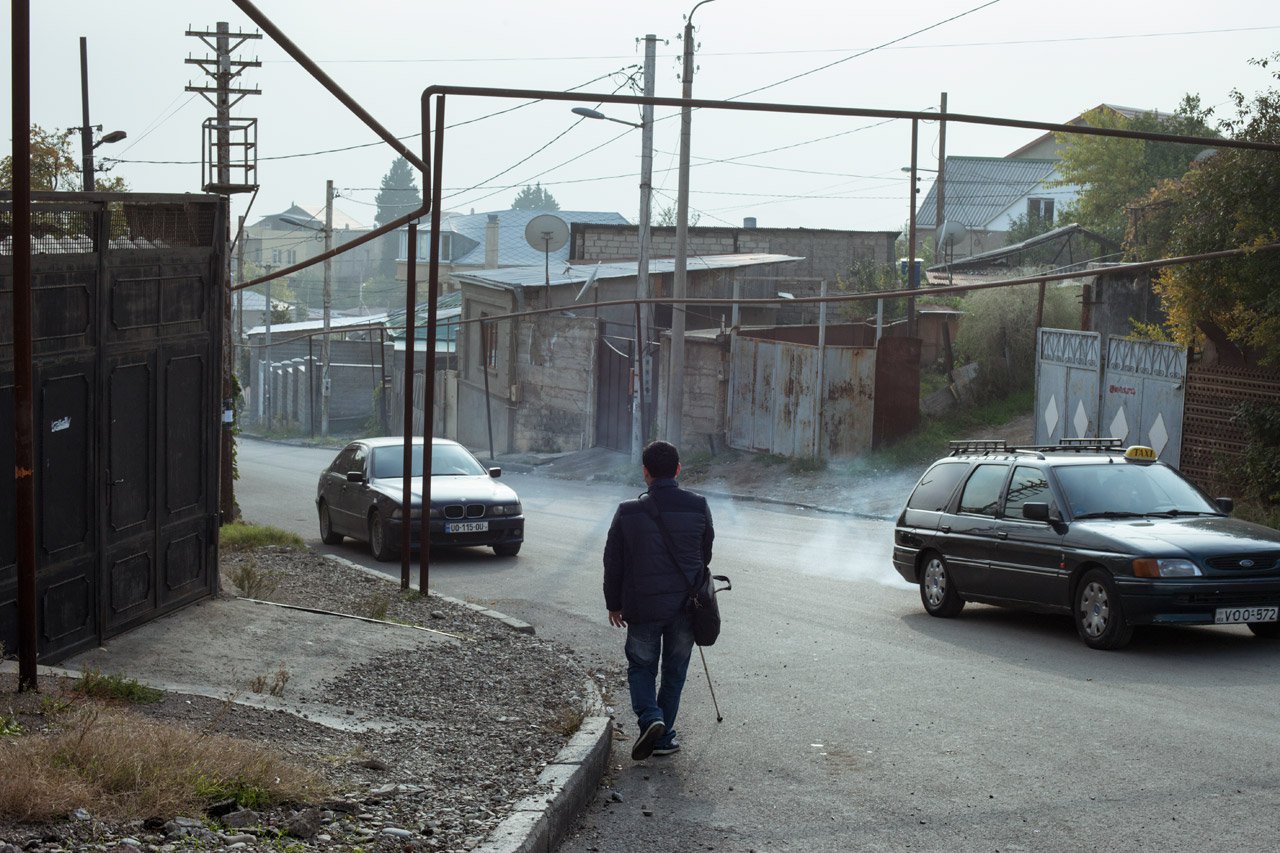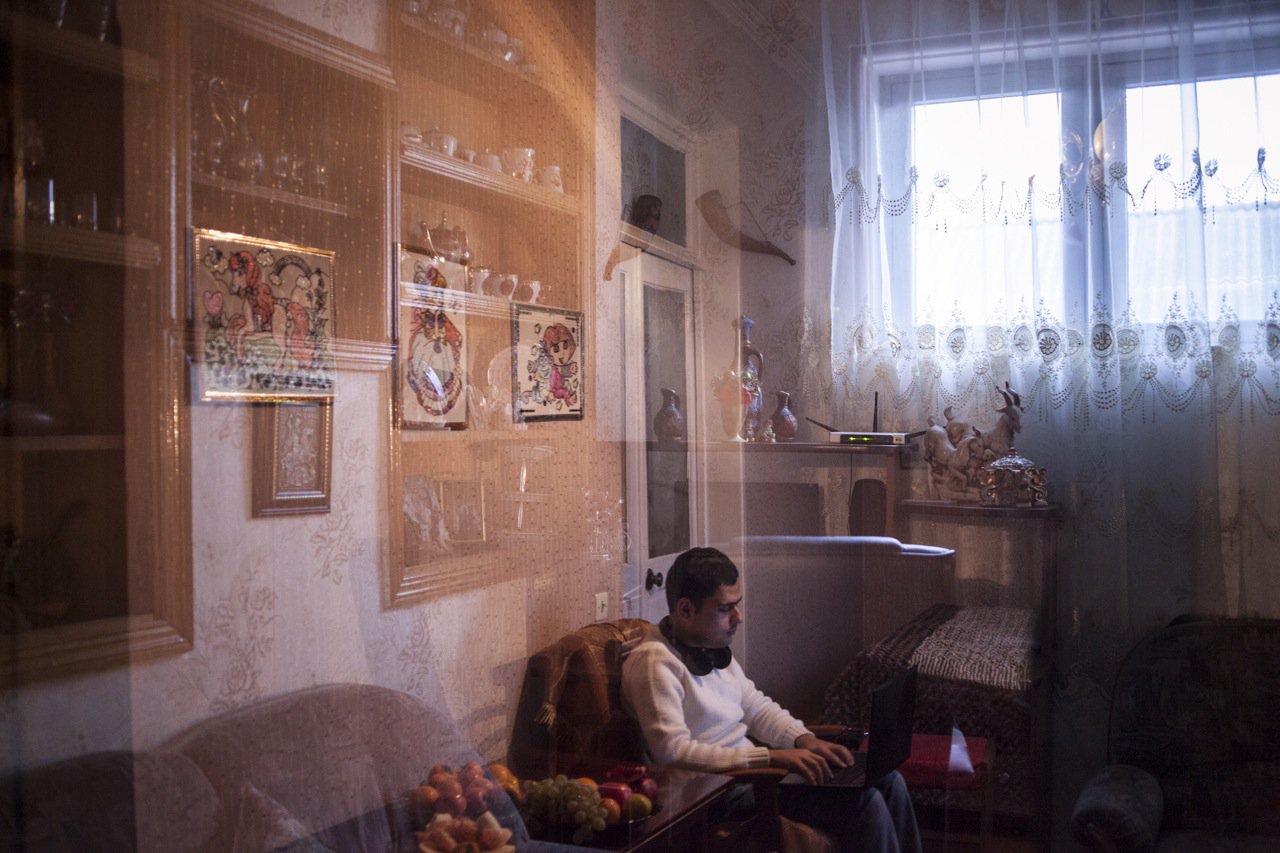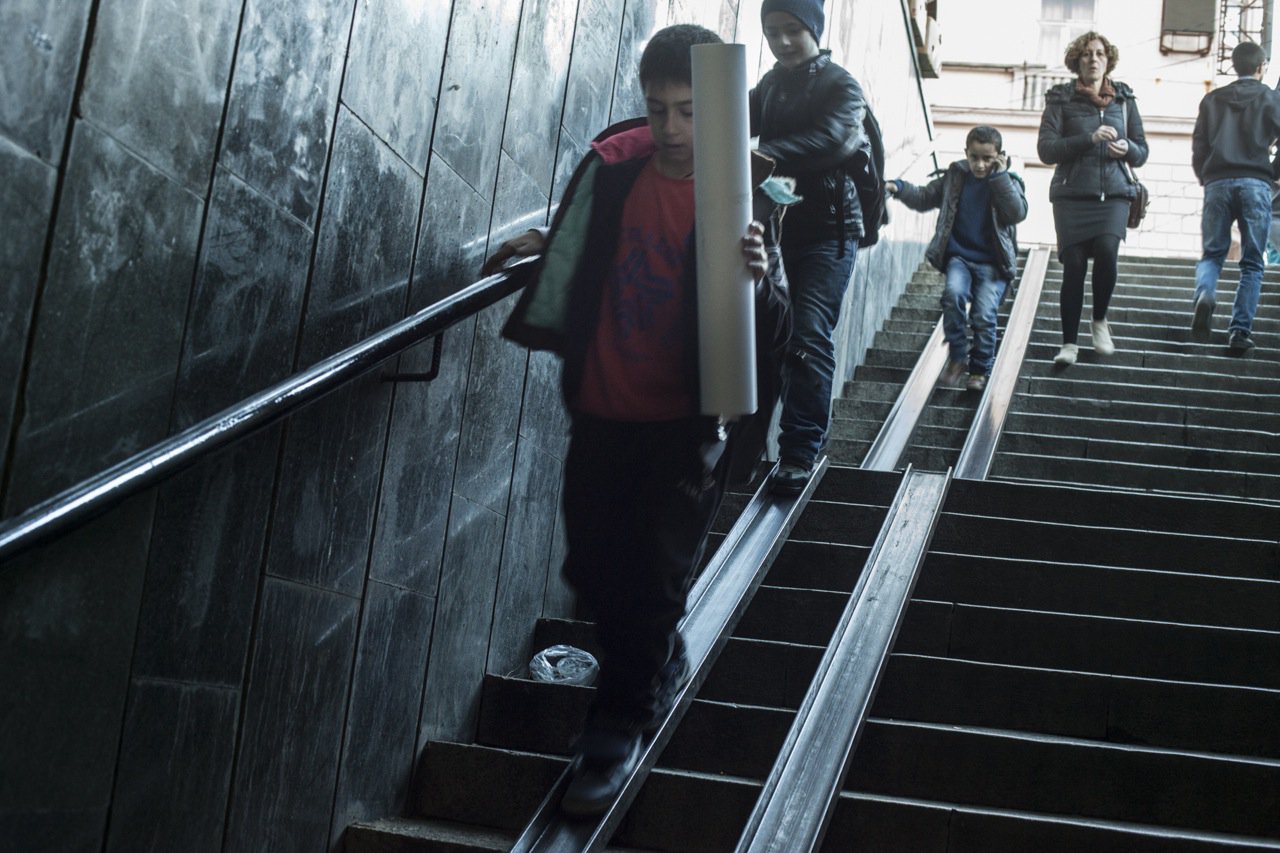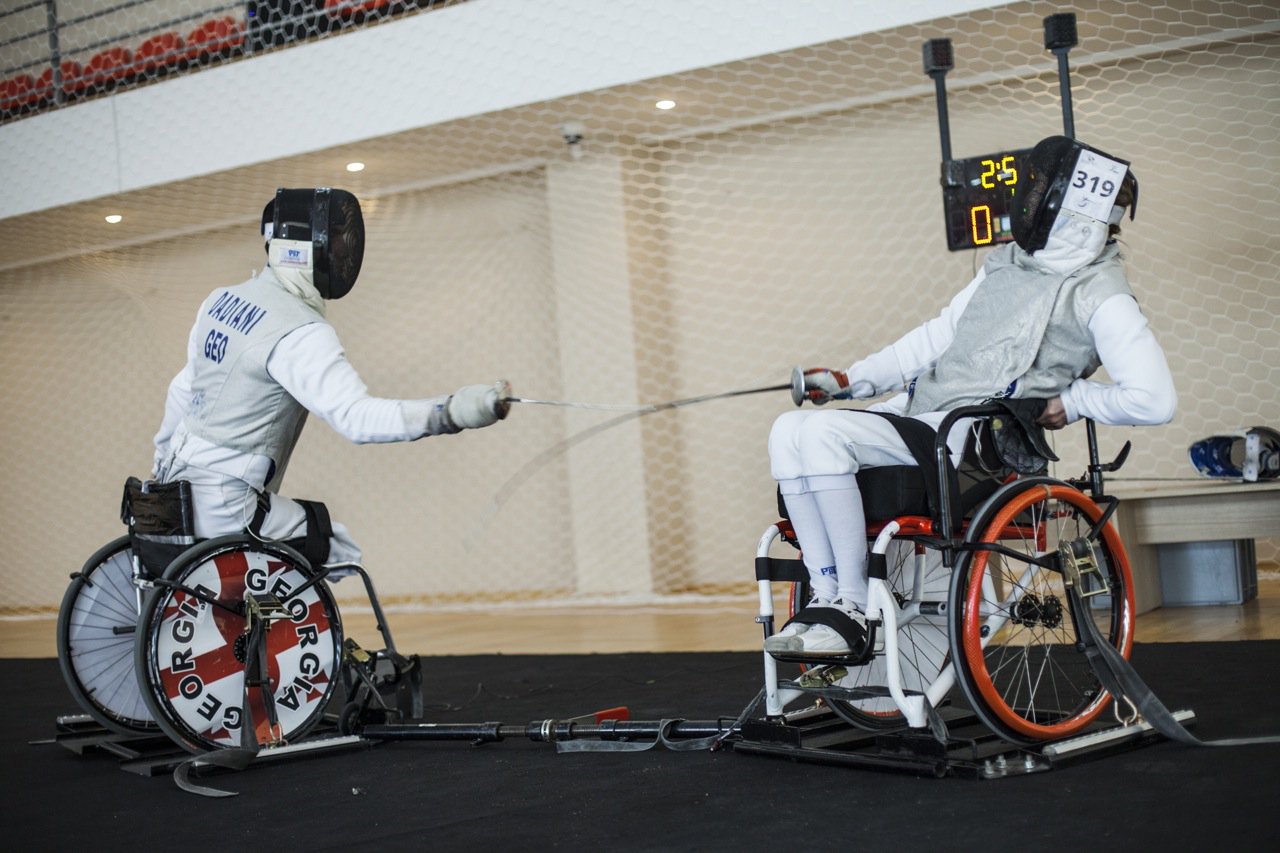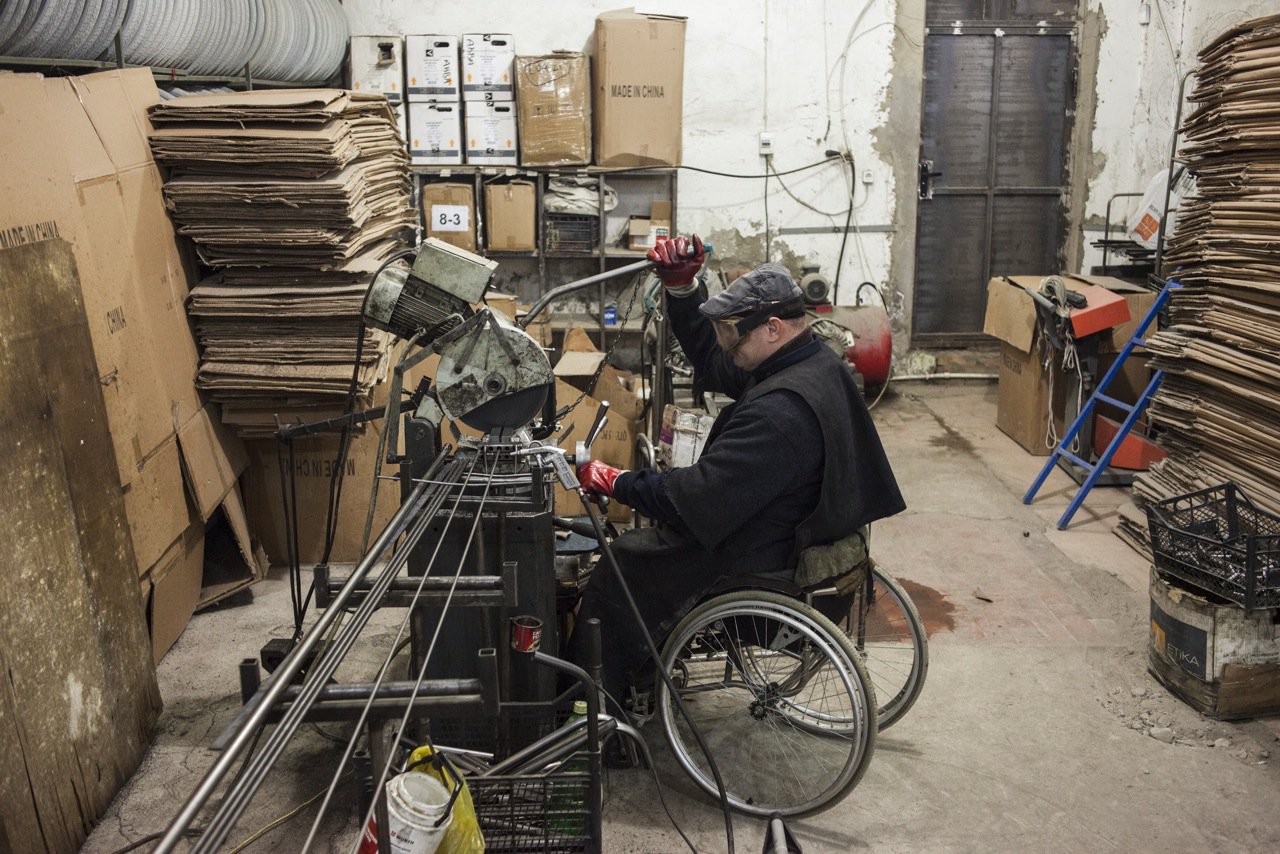The Invisible Wall
Saturday afternoon. June 13 2015. Tbilisi, Georgia.
The rain starts to fall.
It is a sweltering day and the sudden precipitation brings relief to 20 year-old programmer Beqa Gozalishvili.
Sitting with an open window in the 23-storey Tbilisi City Hall, Gozalishvili prefers the cool of winters and hopes fresh air will now descend on the city.
He has joined his colleagues at the weekend to meet a deadline. Gozalishvili is one of the youngest employees in the municipal office.
Now he is typing. As usual, his monitor is turned off. His colleagues are playing computer games. The deadline is met. There is nothing more to do. But they can’t leave - because the rain continues at a greater volume. With greater intensity.
Rushing into the office comes their head of their IT department, Irakli. He tells them the City Hall needs to build an App that will allow Georgians to donate money and supplies to disaster victims.
Tbilisi’s Vere River has broken its banks. Twitter suddenly lights up with messages detailing the horrors. People have drowned.
The city’s zoo, at the foot of the steep valley in which Tbilisi lies, had been struck by the massive flow of water. Its fences are broken and the animals are escaping.
Tigers, wolves and hippos are roaming through the streets, fleeing the deluge. And the people need help and information fast.
Beqa knows he will have to spend the whole night at the office. He calls his mother, Inga.
“Don’t worry,” he tells her.
“How can I not worry?” asks his mother.
“This place is not dangerous. We’re on the 14th floor.”
Inga says ok. She has long learned to stop worrying about what could happen to Beqa.
She trusts him so much that she sometimes forgets he is blind.
Next day at noon the app is ready and the office closes. The water has subsided. Beqa normally takes the shuttle-bus, but now his colleagues drive him home.
Beqa arrives at 2pm and his four-year old brother Andria runs towards him.
Inga has spent the whole night awake watching the news and thinking about her eldest son. She smiles at him - a smile he cannot see - then hurries to set the table.
Georgia has no official statistics on the number of people with disabilities in work. Over 123,000 receive a disability pension from a population of 3.7 million, but the real number is at least double, argue local NGOs.
In the 2014 annual report, Georgia’s Public Defender stated the country has no mechanism to support employment for individuals with a handicap.
So Georgians with a disability who want a job are on their own.
Beqa: overcoming IT boundaries
Beqa has a round and childish face with full lips - but his voice betrays his appearance, with a low and mature tone. He did not know he was blind until he was seven, when he heard a woman saying that he could not see.
It was not a shock, because he lacked the concepts of light, darkness and blindness. His parents hadn’t explained the situation to him, so he wouldn’t feel different from other kids.
For Beqa, listening is his most acute sense.
“I hear a person even if she or he doesn't talk,” he says. “There is some sound coming back from this person. I can hear if there is a wall or a car parked near me.”
People blind from birth make use of the visual parts of their brain to refine the sensation of sound and touch, according to a study by the Georgetown University Medical Center (GUMC).
“We can see that in the blind, large parts of the visual cortex light up when participants are engaged in auditory and tactile tasks,” says the study’s lead investigator, Josef P. Rauschecker, professor in the university’s Department of Physiology and Biophysics. “This is in addition to the areas in their brain that are dedicated to processing sound and touch.”
At the Special School for the Blind in Tbilisi, where Beqa studied until the 12th grade, he first heard about the white cane complex. Parents preferred to shadow their blind children everywhere instead of letting them use the cane on the streets, because people would notice they were blind. Even in schools, parents waited in a room for their kids to finish classes.
“I don’t like blind people,” says Beqa. “I don’t like people who are dependent on others and don’t want to change their life. This is the reason people believe that blind people are stupid and can’t do anything.”
At 15 Beqa decided to walk unaccompanied to high school. He told his parents there would be a time when they wouldn’t be around, and he should face this alone.
The white cane and GPS help him in most situations, and when they are not enough, he can ask pedestrians.
“We are not gods,” he says, “and we sometimes have to ask others for help, even if we are blind or not.”
His first computer is now in the hallway, near a shelf built in the wall that hosts coffee cups and china figurines. It’s a standard computer, bought in September 2008 when Beqa was in the 7th grade. Firstly, he became accustomed to the keyboard, the operating systems and internet surfing.
On every keyboard, the f and the j keys have bumps that help him find the other keys. Then he downloaded the first programming books in Russian, and he learned programming languages such as Delfi, C/C++ and Python.
It took him two years to create the first Georgian speech synthesizer, a voice module which can be integrated into screen readers. It was the idea of his friend, a 33-old blind man, Lado Urdulashvili. Developing a speech synthesizer means creating a large audio library. Beqa prepared 1,300 sentences, while Lado searched for an actor to record them.
The first software version was ready in February 2014, and Beqa offered it gratis to the Blind Union in Tbilisi, under the condition they would distribute it for free to the blind in Georgia. A few months later, Georgia’s Interior Ministry bought the license from Beqa, to use the Georgian speech synthesizer on their website. In summer 2014, he started working at the Ministry of Interior, adapting his own software to their website. He was only 19.
Last year, Beqa sent his CV to five IT companies without mentioning he was blind. Once invited for interviews, the employers discovered that he was visually impaired, and they all told him: “the job is taken”.
The Georgian Labour Code does not forbid discrimination in the workplace for people with disabilities. An inter-ministerial council is now preparing an amendment, which should be voted by the Parliament in 2016, says Elza Jgerenaia, Head of Labour and Employment Policy Department.
At the beginning of 2015, Beqa read about a job opportunity as a programmer at the Tbilisi City Hall. He applied, went to the interview and heard the same sentence “Can you program?”. He was accepted for a two-month trial. Finally he won the position, becoming one of 24 people with disabilities who work in Georgia’s public institutions - from a workforce of 100,000.
USSR: charity in the ghetto
At school, Beqa heard about the Ponichala district in Tbilisi, where blind people lived and worked in the Soviet period. The settlement was created at the end of the 19th century by Tbilisi philanthropists and included classrooms and a few dormitories.
The district developed in the 1930s, when the Soviets built a factory and apartments for the blind. The city’s entire blind community stayed there. Until the 1970s, there was a physical wall separating the district from the rest of the city.
“It is how our blind people lived, and they still live, behind this invisible wall,” says Beqa. “But most of the time, they build this wall inside them.”
This wall existed for him as well. “But time is passing and the wall is shrinking for me,” he adds.
Georgia was part of the USSR until independence in 1991. During this period, the state created social policies for people with disabilities, such as giving them a pension. The number of hospitals and institutions for people with a handicap increased, and special schools were created. The state took pride in its protection of invalids, but one consequence for people with disabilities was segregation and a lack of independence.
At the end of the 1970s, a group of Russian activists in the USSR, including Yuri Kisselev and Valery Fefelov, campaigned for the rights of persons with disabilities to have a job. Instead of being recipients of a social pension and living in institutions, they could be productive members of society.
In a book published in 1986, Fefelov told the story of a Western journalist who approached a Russian official during the Olympic Games in Moscow in 1980. He asked him if the USSR would take part in the first Paralympic Games due to take place at the end of that year in Great Britain.
The Soviet official replied: “There are no invalids in USSR!”
It became the title of Fefelov’s book.
But integration happened slowly. By 2005, when Georgia made the first steps to inclusive education, and kids with special needs went to public schools, the other children’s parents protested. They were afraid that disability could spread like the flu.
Tinatin: excelling in hospitality
The happiest day in the life of Tinatin Kuskusela was when she started working as a waitress at the Tbilisi Marriott Hotel, on 10 May 2002. She was 21 and was close to graduation.
She loved every part of the hotel and the hallway covered in beige wallpaper with a floral pattern reminded her of the lush Edwardian interiors of the Titanic.
But this changed in September 2009. Tinatin was in a car accident. It was a rainy evening and she was driving home from work. She recalls only the face of a policeman asking for her ID, before she fell unconscious.
When she opened her eyes and understood she was in a hospital, her first thought was that she was supposed to work the morning shift, and nobody had told her boss.
Following surgery, Tinatin figured out by herself that she would no longer be able to walk.
Her friends and colleagues supported her. The hotel’s general manager said she would receive her salary during her recovery.
“I wasn’t depressed that I would be in a wheelchair,” she says. “I was ready to go out into the world and return to work. The real tragedy was when I realized I would be dependent on my family for everything. For two years, I was a house plant.”
One day she saw a TV show with Rati Ionatamishvili, a man in wheelchair who danced. Rati works at Tbilisi City Hall. He takes part in dancing contests and writes poetry. Tinatin friended him on Facebook and Rati introduced her to the sporting world. She met people in the Paralympic movement and this encouraged her to leave her sedentary life.
“I got so enthused when I saw people in wheelchair playing rugby and weight-lifting. Their power came from inside.”
Two years after the accident, Tinatin returned to the Marriott where she received a new position: food and beverage assistant. She now supervises the hotel’s cafe and restaurant.
But there are unpleasant moments. One time a customer was unhappy with the service and asked to talk to the boss.
Tinatin showed up in the wheelchair, introduced herself and asked the customer what was wrong.
The man was taken aback.
He insisted that he wanted to talk to “the real boss”.
Fighting for empowerment
The taxi, a shabby Nissan Murano with a scratched windscreen, pulls up in front of the Marriott. The 60-year old driver seems confused when he sees the woman in a wheelchair.
He doesn’t know what to do, but Tinatin muddles through without him and uses her strength to wrestle into the seat next to the driver. She is sometimes ashamed of her well-muscled arms, and even has problems finding suitable clothes.
Taxi and cars are the only available transport for people in a wheelchair in Tbilisi. The public transport system is not accessible, and drivers almost never stop at zebra crossings. On the main avenues, the only way to cross the street are underground walkways or foot bridges. Some walkways have ramps, but the slopes are too steep.
The City Hall installed them a few years ago to show that it had done something for the people with disabilities, but “they are just for show”, says Tamuna Nadiradze, project manager for Coalition for Independent Living.
Tinatin is heading to the Paralympic center, where she is training with twin brothers, Tornike and Tsotne, who both use a wheelchair. She is teaching them an indoor ball game called Boccia. Tinatin explains the rules and the twins are a bit shy, but listen to her with curiosity. It’s almost 7pm.
“You first throw the white ball in midfield, then each team must throw the red and blue balls closest to the white one,” she says.
The third kid who had to come to the training is missing, so Tinatin’s best friend Irma Khetsuriani keeps his place during the game. Irma is an international fencing champion, whom Tinatin met in a rehabilitation center in Ukraine.
A refugee from Abkhazia, she has remained in a wheelchair after suffering spine cancer. In a few days she will take part in the national fencing contest for the Paralympics.
Dancing to the same tune
It’s evening in Tbilisi’s Mravaljamieri restaurant. Irma and her friend Qristina rush toward the dance floor. A few hours before, Irma won the women's fencing finals, but lost the last game to Temo Dadiani, winner of the men’s final and a veteran of the Afghan war.
She is now the only one in a wheelchair among a group dancing to a mix of international hits, Georgian music and Soviet songs.
Irma loves to dance, but the other customers are staring at her, so much so, that sometimes she feels she is making a protest. But she wants to show the others that people in a wheelchair can enjoy life just like anybody else. Then a 30-something stranger stops dancing, gives her a long look and kisses her on the forehead.
Tinatin is also there - but she initially remains at the table. Later they are seated together.
“I’d like to make a toast,” Tinatin says. “For love and life, because as long as you love, it means you’re alive. And for Georgia, a small country that is still surviving.”
Almost every time they go out, people send food or drinks to their table. Some even offer to pay for their surgery in the United States. No one calls the next day to keep the promise.
“People are amazed that we smile, go out and dance,” says Irma.
Tinatin replies that she is sometimes tired of being an example for others and just wants to enjoy a Saturday evening without receiving so much attention. Such charity tends to be from people who only become generous after a few vodkas.
Giorgi: manufacturing accessibility
A small and white mix-breed nudges up close to Giorgi Grigolaia’s wheelchair and keeps pining for food, while the 51-year old man tries to eat undisturbed. He looks from time to time to his colleagues who are playing backgammon.
He’s not in the mood to join them today. During the lunch break, the workshop where these men manufacture wheelchairs is silent, except for the sound of dice rolling, laughter and the barking of the hungry dog.
On 18 May 1993, during the Abkhaz war, when the coastal region of Georgia declared its independence from Tbilisi, a mine exploded near Giorgi, causing him a spine injury. He says that he went to war because it was his duty and doesn’t regret it - although he ended up in a wheelchair and Georgia lost Abkhazia.
For almost 20 years, Giorgi did not earn any money, except for his veteran pension, and was dependent on his family. He worked as a coach in children camps, where he taught the kids how to move in wheelchair. He played basketball with the Paralympics, but he didn’t have a proper job. He did not even try to search for one, because he thought that no one would hire a man in a wheelchair..
In 2010, he heard that the Coalition for Independent Living NGO, where he was a volunteer, was about to open a workshop that produces wheelchairs. Giorgi applied for a job and was accepted.
The workshop, in the outskirts of Tbilisi, was created five years ago through a program financed by the United States Development Agency USAID and implemented by the Coalition for Independent Living.
More than half of the employees working in the workshop in Tbilisi are in wheelchairs. The financing ended one year ago, but the project is self-sustaining.
After being injured, Giorgi felt that his self-confidence was shattered not only by not being able to move, but mainly because he couldn’t bring any money to his family. “I took the subway only once, and I don’t want to repeat the experience again." He tried to go down the escalator, but couldn’t control his wheelchair, which spun into the air and fell down on top of him.
In the workshop, Giorgi mans the cutter. He is slicing tubes of different lengths, which is the first step to producing wheelchairs.
“Sometimes I overdo my job and cut everything!” he laughs. Life has changed a lot for Giorgi after he started working here because the war veteran can support himself and can spend time with his colleagues, who are also his friends. “This job is very important, because it helps me be independent.”
37 year-old Gela Laghidze, also working in the workshop, could not walk from the age of three, so learned to adapt fast.
Gela understood early that he needs to make a living, and to choose something that doesn’t require a lot of physical effort, so he focused on electronics. He learned to repair watches, phones and TVs when still a kid.
In the underground metro, he also saw that people in a wheelchair could not go down the escalators easily. So he dismounted, crawled down onto the steps and pulled the wheelchair behind him. He saw people's shock at first but he noticed that “if you stick to your routine each day, people get used to you”.
In a country like Georgia, where the state’s measures are too weak to produce significant changes for persons with disabilities, Gela learned that if you want to live independent you need to become the hero of your own life.
“When you are determined and motivated to be independent, you find the strength in you to overcome all the difficulties,” says the technician.
Gela returns to his colleagues rolling the dice against the backgammon board.
It’s time for a last game - and then back to work.
The grant for this project is from “Investing in quality journalism on international development- a sustainable approach to raising public awareness of development cooperation and global issues” under the European Development Year 2015 by The Romanian Centre for European Policies (CRPE) in partnership with the United Nations Development Programme - Regional Centre for Europe and Central Asia.
The is part of Romania’s national working plan for the European Development Year 2015 (AED2015), financed by the European Commission and Romania’s Ministry of Foreign Affairs. CRPE is solely responsible for the content, which can’t be viewed as a reflection of the EU or the Ministry of Foreign Affairs’ position.
A Romanian version of this story appears on Think Outside the Box
Follow us
